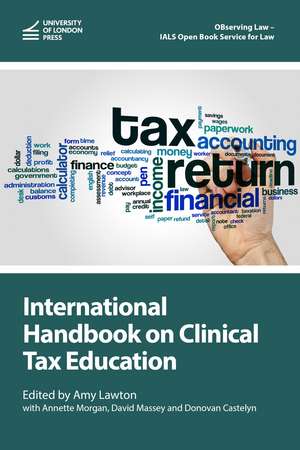International Handbook on Clinical Tax Education: OBserving Law
Editat de Amy Lawtonen Limba Engleză Paperback – 29 mar 2024
Tax clinics, a government-funded initiative to help people who may not be able to afford professional advice and representation with their tax affairs, have existed in the United States since the early 1990s. Now they are being established throughout the world, particularly in Australia, the UK, and Ireland. This practical handbook explores the benefits that a clinical tax education can have and equips readers with the tools needed to start a clinical tax project. It investigates the ways in which tax clinics can both educate and remedy tax positions for local communities in supporting those without access to the tax profession to understand their tax liabilities. It also explores the higher education setting, in which community tax projects rely on students for their success, offering them the benefits of an alternative learning environment in tax and experience in the tax profession while studying. Beyond identifying the practical benefits, this handbook uses learning from tax clinics to uncover the burdens and impacts of tax policy on more marginalized taxpayers, and how policymakers can tailor tax systems to overcome them.
Preț: 321.64 lei
Nou
Puncte Express: 482
Preț estimativ în valută:
61.55€ • 63.90$ • 51.33£
61.55€ • 63.90$ • 51.33£
Carte indisponibilă temporar
Doresc să fiu notificat când acest titlu va fi disponibil:
Se trimite...
Preluare comenzi: 021 569.72.76
Specificații
ISBN-13: 9781911507352
ISBN-10: 1911507354
Pagini: 284
Ilustrații: 7 figures, 15 tables
Dimensiuni: 159 x 235 x 25 mm
Greutate: 0.63 kg
Editura: University of London Press
Colecția University of London Press
Seria OBserving Law
ISBN-10: 1911507354
Pagini: 284
Ilustrații: 7 figures, 15 tables
Dimensiuni: 159 x 235 x 25 mm
Greutate: 0.63 kg
Editura: University of London Press
Colecția University of London Press
Seria OBserving Law
Notă biografică
Amy Lawton is a lecturer in tax law at Edinburgh Law School.
Cuprins
Foreword
Nina Olsen
1. Introduction
Amy Lawton, Annette Morgan, David Massey and Donovan Castelyn
Part 1: The Tax Clinic
2. A brief history of tax clinics around the globe
Donovan Castelyn and Annette Morgan
3. Project administration: how to set up a tax clinic
Amy Lawton
4. Rationale: Tax support for low-income individuals
Tina Riches
5. Rationale: Tax and the poverty interface
Ann Kayis-Kumar, Lily Pan, Michael Walpole, Bradley Hastings and Jack Noone
Part 2: Tax Clinics and our Communities
6. Engagement in the community
Amy Lawton, Annette Morgan, David Massey and Donovan Castelyn
7. Listening to our Communities: The Community Tax Law Project as an example of Low-Income Taxpayer Community Focused Service Provider
David Sams
8. Public Education: the Unilag Tax Club
Edidiong Bassey and Aduloju Oluwatofunmi
9. Public Education: engaging with secondary education in schools
Michelle Lyon Drumbl
10. Taxpayer resolution: improving taxpayer compliance in Indonesia
Kristian Agung Prasetyo and Khusnaini
11. Policy changes: impact on and through the tax court
Keith Fogg
12. Marginalised voices: tax and the criminal justice system
Deborah Wood
Part 3: Tax Clinics and our Students
13. Pedagogical theory and clinical tax education
Amy Lawton
14. Enhancing student experience: shadowing, role plays and reflection
Connie Vitale and Andrew Medlen
15. Introducing tax advocacy to students
Sarah Lora and Christine Speidel
16. Developing Employability Skills through Practice-Based Learning
Eric O. Boahen, Shampa Roy-Mukherjee, Emmanuel Ambe and James Tuffour
17. Students’ professional identity and a fully online tax clinic
Brett Freudenberg, Melissa Belle Isle, Colin Perryman, Kristin Thomas and Ashleigh Cohen
Part 4: Moving Forwards
18. A research roadmap for tax clinics
Emer Mulligan and Margaret O’Neill
19. Moving forwards: tax clinics and business schools
David Massey
20. Concluding remarks
Amy Lawton
Nina Olsen
1. Introduction
Amy Lawton, Annette Morgan, David Massey and Donovan Castelyn
Part 1: The Tax Clinic
2. A brief history of tax clinics around the globe
Donovan Castelyn and Annette Morgan
3. Project administration: how to set up a tax clinic
Amy Lawton
4. Rationale: Tax support for low-income individuals
Tina Riches
5. Rationale: Tax and the poverty interface
Ann Kayis-Kumar, Lily Pan, Michael Walpole, Bradley Hastings and Jack Noone
Part 2: Tax Clinics and our Communities
6. Engagement in the community
Amy Lawton, Annette Morgan, David Massey and Donovan Castelyn
7. Listening to our Communities: The Community Tax Law Project as an example of Low-Income Taxpayer Community Focused Service Provider
David Sams
8. Public Education: the Unilag Tax Club
Edidiong Bassey and Aduloju Oluwatofunmi
9. Public Education: engaging with secondary education in schools
Michelle Lyon Drumbl
10. Taxpayer resolution: improving taxpayer compliance in Indonesia
Kristian Agung Prasetyo and Khusnaini
11. Policy changes: impact on and through the tax court
Keith Fogg
12. Marginalised voices: tax and the criminal justice system
Deborah Wood
Part 3: Tax Clinics and our Students
13. Pedagogical theory and clinical tax education
Amy Lawton
14. Enhancing student experience: shadowing, role plays and reflection
Connie Vitale and Andrew Medlen
15. Introducing tax advocacy to students
Sarah Lora and Christine Speidel
16. Developing Employability Skills through Practice-Based Learning
Eric O. Boahen, Shampa Roy-Mukherjee, Emmanuel Ambe and James Tuffour
17. Students’ professional identity and a fully online tax clinic
Brett Freudenberg, Melissa Belle Isle, Colin Perryman, Kristin Thomas and Ashleigh Cohen
Part 4: Moving Forwards
18. A research roadmap for tax clinics
Emer Mulligan and Margaret O’Neill
19. Moving forwards: tax clinics and business schools
David Massey
20. Concluding remarks
Amy Lawton



